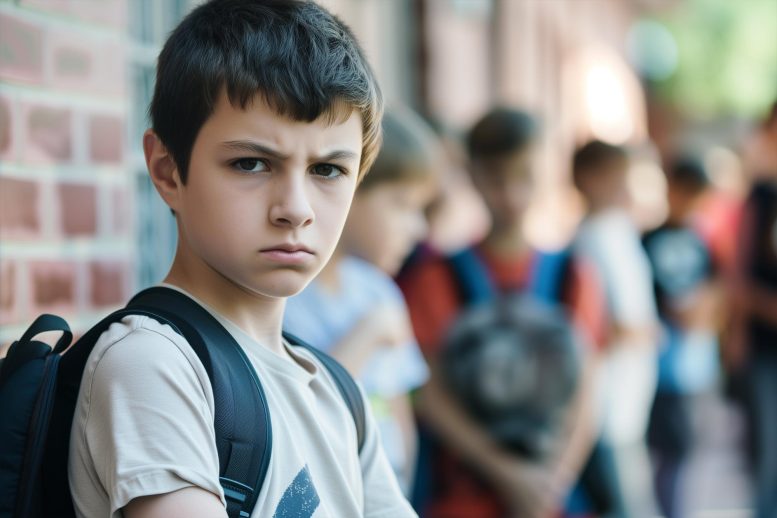Bullying in childhood is directly linked to the development of severe mental health issues in later life through the pathway of increased interpersonal distrust. This connection underscores the importance of early intervention programs focused on building trust among peers. Credit: SciTechDaily.com
UCLA Health researcher says teens who experience bullying and develop distrust of others are 3.5 times more likely to experience clinically significant mental health issues by age 17.
A new study, co-led by UCLA Health and the University of Glasgow, found that young teenagers who develop a strong distrust of other people as a result of childhood bullying are substantially more likely to have significant mental health problems as they enter adulthood compared to those who do not develop interpersonal trust issues.
The study, published today (February 13) in the journal Nature Mental Health, is believed to be the first to examine the link between peer bullying, interpersonal distrust, and the subsequent development of mental health problems, such as anxiety, depression, hyperactivity, and anger.
The Link Between Bullying and Mental Health
Researchers used data from 10,000 children in the United Kingdom who were studied for nearly two decades as part of the Millennium Cohort Study. From these data, the researchers found that adolescents who were bullied at age 11 and in turn developed greater interpersonal distrust by age 14 were around 3.5 times more likely to experience clinically significant mental health problems at age 17 compared to those who developed less distrust.
The findings could help schools and other institutions to develop new evidence-based interventions to counter the negative mental health impacts of bullying, according to the study’s senior author Dr. George Slavich, who directs UCLA Health’s Laboratory for Stress Assessment and Research.
Addressing Youth Mental Health
“There are few public health topics more important than youth mental health right now,” Slavich said. “In order to help teens reach their fullest potential, we need to invest in research that identifies risk factors for poor health and that translates this knowledge into prevention programs that can improve lifelong health and resilience.”
The findings come amid growing public health concerns about the mental health of youth. Recent studies by the U.S. Centers for Disease Control and Prevention found that 44.2% of sampled high school students in the U.S. reported being depressed for at least two weeks in 2021, with one in 10 students who were surveyed having reported attempted suicide that year.
In this new study, the researchers viewed these alarming trends from the perspective of Social Safety Theory, which hypothesizes that social threats, such as bullying, impact mental health partly by instilling the belief that other people cannot be trusted, or that the world is an unfriendly, dangerous or unpredictable place.
Prior research has identified associations between bullying and mental and behavioral health issues among youth, including its impact on substance abuse, depression, anxiety, self-harm, and suicidal thoughts. However, following youth over time, this study is the first to confirm the suspected pathway of how bullying leads to distrust and, in turn, mental health problems in late adolescence.
Slavich said when people develop clinically significant mental health problems during the teenage years, it can increase their risk of experiencing both mental and physical health issues across the entire lifespan if left unaddressed.
In addition to interpersonal distrust, the authors examined if diet, sleep or physical activity also linked peer bullying with subsequent mental health problems. However, only interpersonal distrust was found to relate bullying to greater risk of experiencing mental health problems at age 17.
Conclusion and Recommendations
“What these data suggest is that we really need school-based programs that help foster a sense of interpersonal trust at the level of the classroom and school,” Slavich said. “One way to do that would be to develop evidence-based programs that are especially focused on the transition to high school and college, and that frame school as an opportunity to develop close, long-lasting relationships.”
Reference: “Bullying fosters interpersonal distrust and degrades adolescent mental health as predicted by Social Safety Theory” by Dimitris I. Tsomokos, and George M. Slavich, 13 February 2024, Nature Mental Health.
DOI: 10.1038/s44220-024-00203-7
The study was co-authored by Dr. George Slavich, Professor of Psychiatry and Biobehavioral Sciences at UCLA, and Dr. Dimitris Tsomokos, a researcher at the University of Glasgow.
Note: This article have been indexed to our site. We do not claim legitimacy, ownership or copyright of any of the content above. To see the article at original source Click Here













